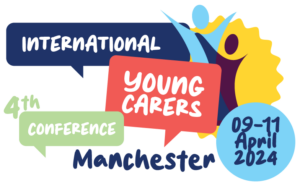Young Carers’ Fair Futures
The call for abstract submission is now closed.
Guidelines for submission of proposals (also known as abstracts)
The key conference themes/subthemes to choose from:
INCLUDE TO EMPOWER: “nothing about us without us”
- Personal stories of young carers’ involvement in advocacy work, policy, practice, or research
- Power sharing with young carers in service design and delivery, policy making and research
- Experiences of co-design in research and development work for and with young carers
- Empowering young carers to identify needs for change and creating change on an individual, organisational and/or national level
IDENTIFY AND REACH: let’s ensure that all young carers are heard
- Reaching out to young carers and, in particular, unheard/forgotten groups (e.g. from migrant/refugee communities, LGBTQ, male young carers, siblings carers, rural young carers)
- Cultural/family expectations around caring and their influence on (self)-identification of young carers
- Raising awareness about young carers – among general public, professionals and policy makers
- Breaking down barriers and empowering professionals so that they can identify young carers
SUPPORT FOR IMPACT: changing the lives of young carers
- Assessing young carers’ needs/goals and providing support tailored to their individual needs and goals
- Towards young carer friendly educational and/or employment systems
- Supporting young carers’ (mental) health and wellbeing
- Whole family, multi-stakeholder approaches to support young carers
- Innovative service provision, including technology advancements for and with young carers
- Positive outcomes of caring in research, policy and/or practice
If your abstract does not fit into any of the above themes/subthemes, you can choose the option “Other”.
Types of presentation
Submissions can focus on research, policy, advocacy, practice, legislation – at a local, regional, national or international level – or a lived experience.
Please find below suggestions about the content for each type of presentation:
Presentation format
Time allocated for each presentation: 10-15 minutes maximum, followed by questions and discussion with the audience.
Overall structure for your Proposal/Abstract
- Introduction (rationale and core aim/s of the paper/workshop and how it is related to the selected theme and subtheme)
- Objectives
- Target audience
- Learnings/Take away message/s
- Outline plan for the session plus timing. Please outline how you’ll ensure interaction with the audience
- List of key references/resources
Word limit for proposals/abstracts: maximum 250 words (the final two items are not included in the word count)
Proposals/abstracts are to be presented and submitted in English.
Please note: as the conference is an in person event, the expectation is that presenters will physically attend the conference.
If you have any questions, please contact Lucy Henry, PA to the Director of the Institute for Children’s Futures, Manchester Metropolitan University, UK, email: PAtoDirectorofIforCF@mmu.ac.uk
- Agnes Leu, professor & advisor, Careum School of Health, University of Basel, Institute for Biomedical Ethics, Switzerland
- Amarantha Bourgeois, Director of “Jeunes AiDants Ensemble – JADE” (Young Carers Together), France
- Daniel Phelps, independent consultant in policy and practice development for children with caring responsibilities (young carers) and their families, UK
- Elizabeth Anne Olson, professor, chair of Social Geography, University of North Carolina at Chapel Hill, USA
- Elisabeth Nordhus Lied, former young carer and adult young carer, facilitator of young carers peer support groups, the Church City Mission, Norway
- Feylyn Lewis, Assistant Dean Student Affairs, Vanderbilt School of Nursing, Nashville, USA, former young carer and young adult carer
- Francesco Barbabella, senior researcher, Linnaeus University, Swedish Family Care Competence Centre, Sweden
- Giulia Casu, associate professor, Department of Psychology, University of Bologna, Italy
- Licia Boccaletti, president of the cooperative Anziani e non solo (Not Only Older People), Carpi, Italy
- Michael Buynsters, coordinator of the Strategic Alliance for Young Carers, the Netherlands
- Nynke de Jong, Study Advisor, University of Twente, the Netherlands, former young carer and young adult carer
- Maddy Buchner, Founder and Director, Little Dreamers Australia
- Nikki Dunne, research director, Family Carers Ireland
- Padraig McGrath, Young Carers Lead, Family Carers Ireland
- Pauline Johansson, associate professor, Linnaeus University, facilitator Swedish Family Competence Centre
- Renske Hoefman, researcher, manager, Netherlands Institute for Social Research
- Valentina Hlebec, professor, chair of social informatics and methodology, University of Ljubljana, Slovenia
Chaired by Elizabeth Hanson, professor, Dept. Health and Caring Sciences, Linnaeus University, research director, Swedish Family Care Competence Centre, board member, Eurocarers.
Last Updated on December 15, 2023

